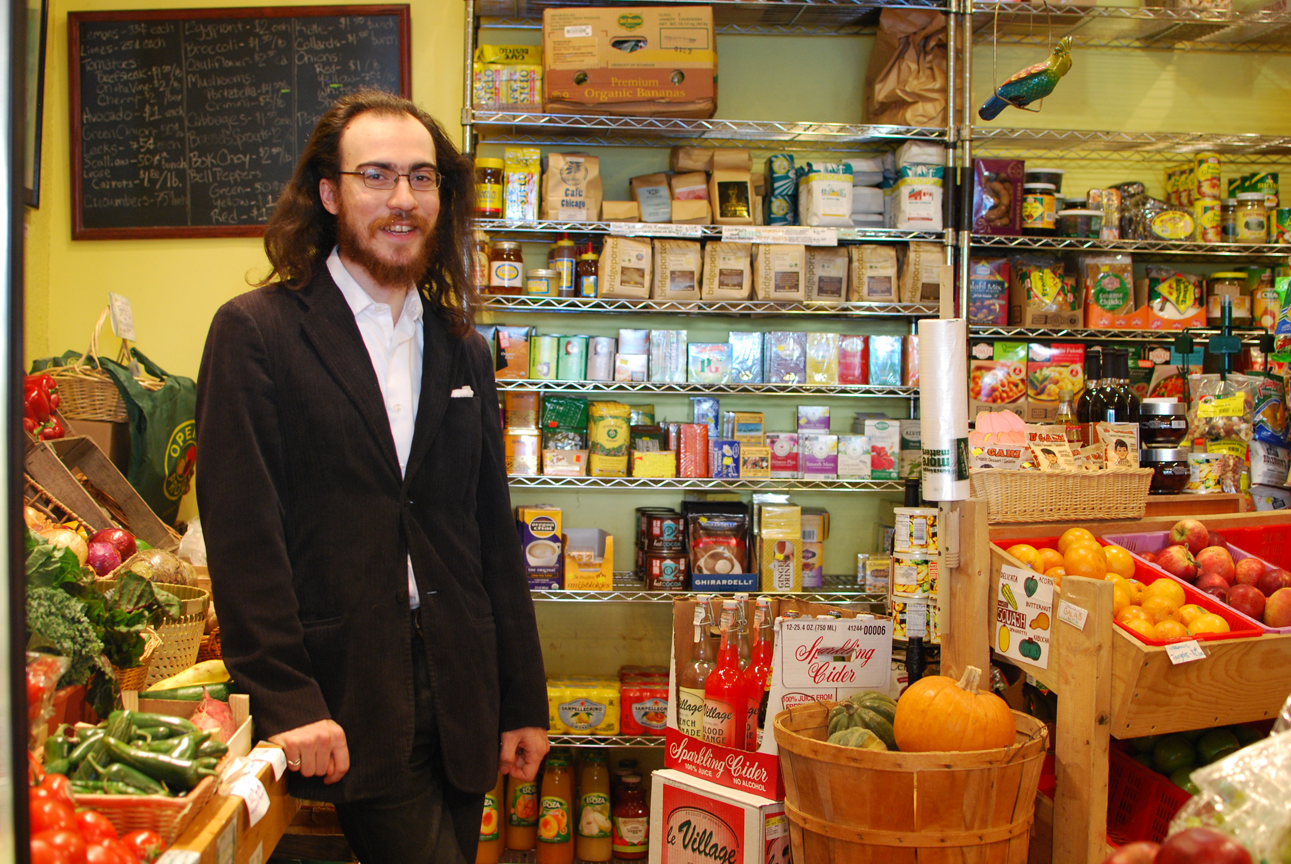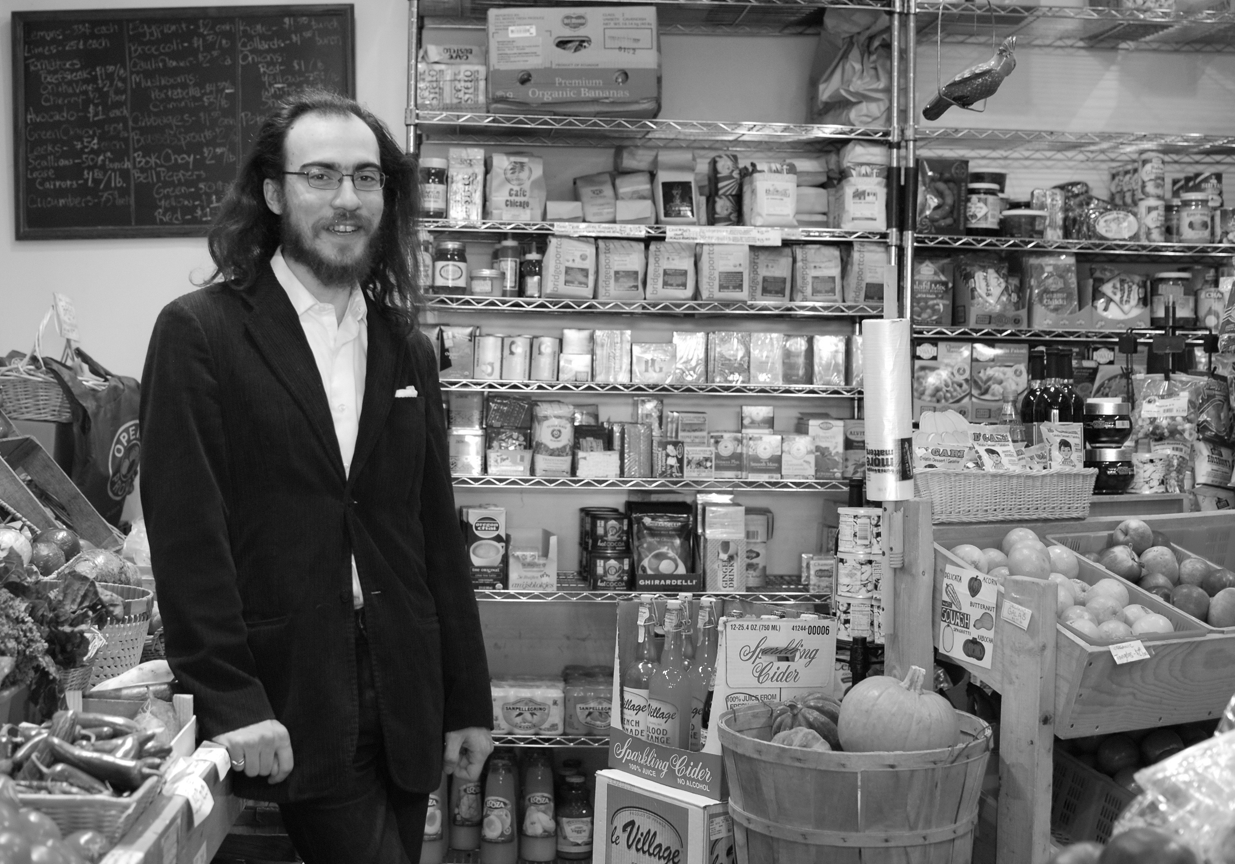
Steven Lucy has deep roots in Hyde Park. When he was born, his parents, currently resident masters at the University of Chicago’s South Campus Residence Hall, were resident heads at Broadview, another UofC dorm. Lucy graduated from the school in 2006. Two years later, he co-founded Open Produce, a high-end, hole-in-the-wall grocery store on 55th and Cornell. Since opening, the store has been committed to financial transparency, posting all of its sales online. Last year it turned a profit for the first time, making $31,000 off $906,000 in sales.
What was your job before Open Produce?
I was a freelance computer programmer. I got really bored of working on other people’s projects and I got really tired of looking at a computer screen all day. I wanted to work on a project that was my own, and I wanted to work with people and visible objects. So a friend of mine and I sort of talked each other into opening a retail produce store.
You were living in New York when you decided to start the business. Why did you decide to move back to Chicago and open the store in Hyde Park?
One reason is that I feel like I know Hyde Park really well, and if I felt like Hyde Park needed something, it probably needed it. People ask us sometimes, “Oh, did you do any market research for this store?” The market research I did was that I lived here for many years. I think when people run businesses in their own communities, those businesses serve those communities better. They know what the community needs. They don’t have to guess.
Why were you interested in opening a produce store?
I think a number of reasons. One is that I’ve lived in East Hyde Park for a while and I felt the absence of that in that part of the neighborhood. You’d have to walk a mile to Hyde Park Produce.
We were getting interested in the local farming movement and moving away from the commercial distribution train, so it was our goal from the beginning to work with local farmers and local producers. It turned out to take a little while for us to get around to doing that successfully—at the beginning it was all conventional, because we became overwhelmed with running a store. It took us years to get things under control enough to explore other options.
Where do you get your produce from?
In the summer it’s a good mix; we get maybe half of our produce from local farms and half commercially. In the winter it’s more commercial stuff, from California or Mexico, because nothing grows around here in the winter. But that’s just for produce; everything else is a mix. We work with over thirty-five producers. Some of them are local from Chicago, and some are international importers.
It’s important for us to not be too ideological. I feel like a lot of small stores are like, “We’re an organic store,” or “We’re a whatever store,” and we wanted to serve everyone as best we could. So we didn’t want to fall into these ideological traps.
Do you think this could become a widespread movement, with more small stores becoming at least half organic?
Yeah. I don’t think you could exactly open an Open Produce somewhere else. One of the things about Open Produce is that it’s a product of the neighborhood it’s in. We didn’t just put a cookie-cutter solution down in this neighborhood. It’s built to match East Hyde Park. If you made one in West Hyde Park or Woodlawn or anywhere else, it would be different. But I think it would be successful.
Are you still programming on the side, or working full-time at the store?
For the first three years of Open Produce I wasn’t paying myself at all from the store. I was surviving on programming on the side, but I was still full-time at the store. But the last two years I’ve been able to pay myself. I still do programming sometimes, but it’s not my main job.
You recently bought Cornell Florist, the flower shop next door. What was the reasoning behind that?
The old owners were retiring and we bought it about a year ago, in December 2012. They approached us and at first we were not very interested, but as we got to know them a bit better and worked a few days at their shop and saw how it was run and looked at their books, we decided it was worth trying to take it over and make it better. We care a lot about the strip on 55th Street next to the tracks, and we wanted to keep what we felt was an asset to that strip, and improve it.
What are some of the challenges of running a small business, especially one that relies on local farms?
Yeah. Oh boy. All right, there are a number of things. I’ll just start with one, which is money. The amount of money it takes to start a small business took me completely off guard. We started with a loan of $30,000 and we blew through that before we even opened. Then we lost money for four years. So by the time we started breaking even and making money, we had lost about $150,000. And that’s not money that’s easy to come by. Banks don’t loan to start-up businesses at all. Venture capitalists aren’t interested unless you’re a technology company. The way most people get money to start their business is they borrow it from family or friends or they put their house up. But I don’t have a house.
What was your motivation to keep going before you broke even?
A couple things. One of them is that we invested not only money but also so much effort and mental energy in it that we really wanted it to succeed. The other thing is that I thought it was a really good thing for the neighborhood. People seemed to really like it and I was happy with what it was doing on the street for the neighborhood. Certainly if I was just interested in making money I would have given up at some point, long before now.
Would you do it again?
I would do it again but I would do two things differently. The first thing is, I would start with more money. There was so much stress from being undercapitalized, and also so many things we could have done earlier if we had access to money earlier. The other thing is I would have gone and worked at a produce store first, as an employee, even for just three months or six months, because we had to learn all of this basic stuff that we could have learned on someone else’s dime. We had to reinvent the wheel a lot.
Why do you think the store is important for the neighborhood?
A couple of distinct reasons. One is just the most obvious, which is that there’s a place people can buy food. Good food. Nearby. Late at night. It’s very practical access to good food. But another thing is—one of our goals, and I think that we’ve been pretty successful with this—is to make a place where people can buy things, like a store, but also make it a place that’s people buying things from people. I feel sometimes in big stores it’s like you and the cashier are cogs in a giant capitalism machine, and you’re just there to exchange money and that’s it. And I really wanted to not have that feeling at Open Produce. I wanted the people to feel autonomy while they were at work, and I wanted the customers to feel like they were being people while they were being customers.
And I think we’ve been pretty successful at that. We know a lot of customers’ names, they know a lot of our names. People meet, regular customers meet each other at the store. It’s a community social hub, as well as a place where people buy things.
And the third thing is, I think it makes the neighbor safer to have businesses that are open late and people going to and from those businesses. There’s more street traffic, more eyes on the street.
What do you think about the future of the store? Have you got any big plans?
We have a lot of ideas and no plans.


My hat off to Steven for perceiving the value of a place of commerce that emphasizes human connections, for filling a need in a community he cares about and filling that need, for having the courage to carry on through debt and doubt and for surviving with ideals intact. Nice article!